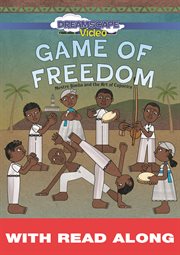Fiction
eVideo
Details
PUBLISHED
Made available through hoopla
DESCRIPTION
1 online resource (1 video file (approximately 27 min.)) : sd., col
ISBN/ISSN
LANGUAGE
NOTES
Directed by Andy T. Jones
A meia lua whooshed in the air. The strike was evaded and followed with an au. Two young men were playing capoeira in the middle of the roda. Bimba wanted to play too. Although it is debated when and where capoeira, an art form that blends martial arts, dance, acrobatics, music, and spirituality, originated exactly, one thing is certain: in the early 20th century, Brazil was the only country in the world where capoeira was played, and it was mainly practiced by people of African descent. In 1890, two years after Brazil officially abolished slavery, the game was outlawed. Wealthy, lighter-skinned society feared and looked down on capoeira, seeing it as a game for malandros, what people in power called the poor Black communities they disdained. But in the early 1920s in the city of Salvador, a man called Bimba would advocate for capoeira, and those who practiced it, to be treated with dignity and the respect it deserved. Duncan Tonatiuh's lyrical prose and beloved illustration style, inspired by pre-Columbian codices, tell the story of arguably the greatest capoeirista of all time, who fought to turn a misunderstood, persecuted Afro-Brazilian activity into a celebrated art practiced by millions around the world
Not rated
Mode of access: World Wide Web







